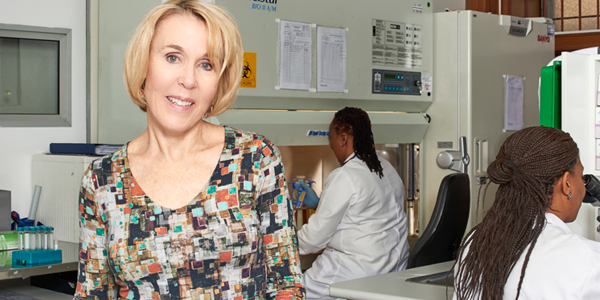Life-saving new vaccines for Africa
- Wits University
"Wits and Vaccines: the impact and potential of vaccines for Africa” is the title of a lecture hosted by Wits Faculty of Health Sciences on 1 November, 17:30.
Vaccinations. together with access to clean water, have had the biggest impact on public health globally since the 20th century, which saw the control of fourteen diseases through vaccine use, including the eradication of smallpox and near-eradication of polio.
Today, life-saving new vaccines are being developed that are targeting all age groups, different populations and devastating disease outbreaks, such as Ebola and yellow fever. However, especially in Africa, far more can be done to increase the impact of immunisation, and to address neglected- and emerging disease threats through the development of new vaccines.
The 16th prestigious research lecture will profile the work of two of Wits University’s internationally recognised, African-led research institutions working in the field of vaccinology, and outline the impact of vaccine research on regional and global health outcomes. The lecture will be delivered by Co-Directors of the Wits African Local Initiative for Vaccinology Expertise (ALIVE); Professor Shabir Madhi, Professor of Vaccinology in the Wits Faculty of Health Sciences and Director of the Medical Research Council (MRC) - Respiratory and Meningeal Pathogens Research Unit (RMPRU) and Professor Helen Rees, Executive Director of the Wits Reproductive Health and HIV Institute (Wits RHI).
The research undertaken by the 21-year-old RMPRU has focused primarily on the leading causes of death in children under-5 years of age, namely pneumonia and diarrhoeal disease. Professor Madhi reveals: “The research has more recently been expanded to focus on vaccination of pregnant women to protect the mother, foetus and newborn. The first randomised placebo-controlled trial showed that influenza vaccination of pregnant women provided approximately 50% protection in the mothers and their young infants against influenza illness.”
Because of the evidence provided in landmark studies undertaken by RMPRU, the World Health Organization (WHO) has recommended that a number of new vaccines are included into public immunisation programmes of low-middle income countries. Included are the first randomised controlled trials on a pneumococcal conjugate vaccine, which target the most common cause of death from pneumonia, and the rotavirus vaccine that targets the most common cause of diarrhoeal associated death in children. Both these studies were published in The New England Journal of Medicine.
“Largely from this local-led study, South Africa was the first country on the African continent to introduce these vaccines into its childhood public immunisation programme. In doing so, immunisation of South African children with these two vaccines has resulted in 40-50% reduction in all-cause pneumonia and diarrheal hospitalization,” he says. “In addition, the lives of approximately 45,000 children have been saved since these vaccines were introduced into the public immunisation programme in 2009.”
In addition to the introduction of new vaccines, a priority area of vaccine research focuses on immunisation coverage of the target population. While a vaccine can protect an individual, high immunisation coverage is required to protect whole populations. Moreover, the Global Vaccine Action Plan adopted by the WHO in 2010 introduces the concept of immunisation across the lifespan to give population protection against a range of diseases beyond childhood.
Complementing the work of RMPRU, the Wits RHI, established in 1994, has focused on the introduction of vaccines into adolescents and older age groups. In preparation for the introduction of the Human Papillomavirus (HPV) vaccines into South Africa in 2014, Wits RHI undertook a series of evaluation and acceptability studies. With the successful introduction of HPV vaccines among 9 and 10-year-olds, Wits RHI is now exploring the impact of HPV vaccines on the epidemiology of HPV and its potential impact on the prevention of a range of HPV related cancers.
“With the successful global introduction of the HPV vaccine among 9 and 10-year-olds, there is a growing interest in adding other vaccines aimed at protecting adolescents and young adults. In this lecture, we will explore what else could be offered as part of an adolescent vaccine platform, and present on-going work on the development of new vaccines for other sexually transmitted diseases including herpes simplex vaccines, gonorrhoea and HIV,” explains Professor Rees.
While new vaccines are being developed that are targeting all age groups and different populations, the threat of emerging pathogens, especially in the African region, has also created urgent calls for the accelerated development of vaccines that can be used to prevent potentially devastating disease outbreaks. The Wits RHI has, for many years, been working with the WHO and Global Alliance for Vaccines and Immunization (GAVI) to assist in the development of global and regional policies and priorities for new vaccines.
Celebrating Wits University’s leadership in vaccinology, the prestigious lecture will end by outlining a new flagship programme awarded to the University in 2016 by the South African Department of Science and Technology/ National Research Foundation (DST/NRF), to strengthen African leadership in vaccinology research and advocacy. This flagship programme, Wits ALIVE, brings together accomplished Wits scientists with a broad range of expertise relating to vaccines and immunisation and aims to foster multi-disciplinary collaborations, build capacity across the region and fill critical knowledge gaps for new vaccine development and deployment.
About Professor Shabir Madhi
Professor Shabir Madhi, is an international leader in the field of Vaccinology, for which he has been acknowledged with an A-rating by the National Research Foundation since 2011. He completed his undergraduate and postgraduate training at Wits (M.B.Ch.B, 1990) and qualified as a paediatrician in 1996 (FC Paeds (SA), M.Med Paeds (SA) 1998, and PhD 2003). Professor Madhi holds the position of Professor of Vaccinology in the Wits Faculty of Health Sciences and is Director of the Medical Research Council (MRC) - Respiratory and Meningeal Pathogens Research Unit, as well as the DST/NRF South African Research Initiative Chair in Vaccine Preventable Disease, and Co-Director of the Wits ALIVE programme.

About Professor Helen Rees
Professor Helen Rees (GCOB, OBE, MB BChir (CANTAB) MA (CANTAB), MRCGP, DCH, DRCOG, RCOG FP instructor, mAssaf) is Executive Director of the Wits RHI at the University of the Witwatersrand, where she is also a personal professor in Obstetrics and Gynaecology and the Co-Director of the Wits ALIVE programme. Wits RHI is the largest research entity of the University of Witwatersrand with a mandate for research, health systems strengthening and training in the fields of HIV, reproductive health and vaccines. She is an Honorary Professor at the London School of Hygiene and Tropical Medicine where she also served as the international Heath Clark lecturer and is a member of their Visiting Committee. She is an Honorary Fellow at Murray Edwards College, Cambridge University, and an alumnus of Harvard Business School as well as being a Gold Medal award member of the South African Academy of Science.

